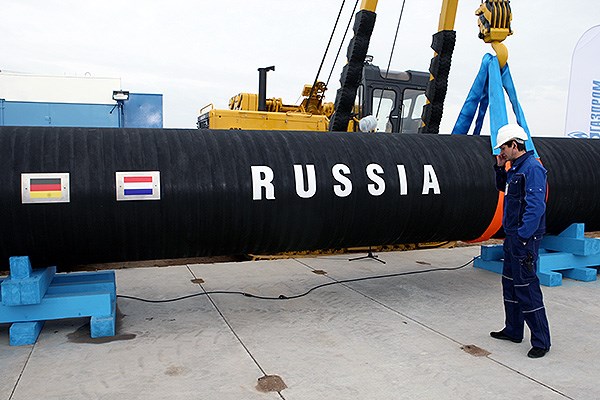Russia condemns US sanctions against Nord Stream 2 gas pipeline
The Russian Foreign Ministry stated that US sanctions against companies that are participating in the construction of the Russ an Nord Stream 2 gas pipeline are aimed at European countries, not Russia.
The Russian Foreign Ministry claims that the sanctions in the US National Defense Authorization Act (NDAA) 2020 are aimed at depriving Europe of guaranteed sources of energy supplies from Russia.
"Moreover, the desire to harm Russian exports is not the only and not even the main thing. To no lesser extent, there is a desire to sell American liquefied gas to Europe, which costs much more for Europe than pipeline supplies from Russia, and thereby slow down the development of its economy, and to undermine the ability to compete with the United States on world markets," reads the statement of the Russian Foreign Ministry.
The Ministry also said that Russia will continue to implement its economic projects despite the sanctions.
"However, it will be interesting to see if the European countries are sovereign. For example, a commanding voice from Washington demands that Germany unconditionally finance the US energy industry, forgetting about their economic interests," reads the statement.
The press secretary of the Russian Foreign Ministry Maria Zakharova wrote on her Facebook page that she is surprised by the US sanctions and wrote that "the American ideology of life on loan could not survive the global competition."
The US sanctions stipulated in the National Defense Authorization Act (NDAA) can apply to companies which provide vessels for the construction of export pipelines. In the case of Russia’s Gazprom, the providers are Swiss Allseas and Saipem, which own the world’s fastest pipe-laying vessels, which can lay up to 5 km per day.
According to the amendments to the NDAA authored by Republican Senator Ted Cruz and Democrat Jeanne Shaheen, such restrictions will safeguard Europe’s energy security.
The initial version included severe sanctions on Russian government debt, with restrictions on the secondary market and ruble-denominated bonds, of which $44 billion is held by non-residents of Russia.
The bill gives the US Department of State 60 days to compile a list of companies that will come under the sanctions. The companies will then be given another 30 days to cease their activity.
The US could have imposed sanctions on the participant companies even earlier: They were set out in the Countering America’s Adversaries Through Sanctions Act (CAATSA), which was passed in 2017, notes Gerhard Mangott, professor of political at the University of Innsbruck, an expert on Eastern Europe.
However, the Trump Administration chose not to do so, even though Germany’s position in the dispute with the US was inherently weak: “If Germany had tried to get revenge by punishing the Americans for the sanctions on Nord Stream 2, it would have found itself in a very vulnerable position with regard to restrictions against the German automotive industry,” said Mangott.
Even without US sanctions, Gazprom’s export opportunities have taken a hammering. In September, the European Court of Justice banned the Russian company from utilizing more than half of the capacity of the OPAL pipeline – the land offshoot of the first Nord Stream line.
The decision was made based on a lawsuit from Poland, which insisted that, by giving Gazprom access to the pipe that pumps gas from Nord Stream to countries in Central and Western Europe, the European Commission violated the principles of the EU gas directive, which prohibits one company from being both the gas supplier and the owner of the pipeline.
For Gazprom, this decision means a loss of 18 billion cubic meters per year, one third of Nord Stream 1’s designed capacity (55 billion cubic meters).
